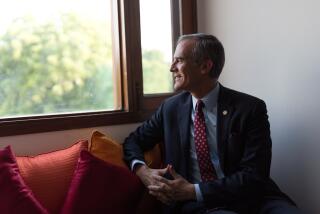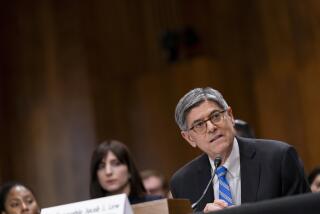Pelletreau ‘Won’t Tolerate Any Slipperiness’ : ‘Premier Diplomat’ Will Launch U.S. Talks With PLO
- Share via
WASHINGTON — The historic task of opening a dialogue between the United States and the Palestine Liberation Organization rests on the shoulders of Robert H. Pelletreau Jr., one of the State Department’s most experienced Middle East envoys.
The dramatic move to open talks came as no surprise to Pelletreau, who has been U.S. ambassador to Tunisia since 1987. State Department sources say that he has been aware of the possibility for several weeks.
“Since the momentum began to gain speed last month, we decided that if the PLO bit the bullet, Tunisia would be the logical place for negotiations, and Pelletreau, fortunately, was the best man to do it,” a senior State Department official said. “He is truly one of our premier diplomats.”
Headquarters for PLO
Tunisia has been the headquarters for the PLO since the organization’s evacuation from Lebanon in the aftermath of Israel’s 1982 invasion.
State Department sources said Pelletreau is likely to approach the delicate and controversial negotiations with an even but firm hand. His professional stature is among the most highly regarded in Washington diplomatic circles.
“He maintains his objectivity at all times,” one colleague said. “Bob is very even, very measured. He always also has a full measure of things.”
This colleague added: “He’s a cool customer. He knows what is at stake, and he will take a firm stand. He won’t tolerate any slipperiness from the PLO.”
Chief Mediator
If Pelletreau, 53, remains the chief mediator, it could at least temporarily cost him a top appointment in the Bush Administration. He has been among two leading candidates for the job of assistant secretary of state for Near East and South Asian affairs.
Dealing with PLO chief Yasser Arafat will not be his first delicate assignment, however. He was posted to Damascus several years ago at a time of particularly strained relations with Syrian President Hafez Assad.
Other diplomats based in Syria used to marvel at how Pelletreau managed to gain unusual access to leading officials at a time when envoys from nations with friendlier relations had difficulty even getting their calls returned.
Pelletreau also arrived in Tunisia, traditionally a strong pro-Western country, shortly before the 1987 overthrow of former President Habib Bourguiba, who had ruled that nation since it gained independence from France.
“He helped ensure that relations remained strong with the U.S. under the new government,” said a State Department source who has worked with him closely for years.
A distinguished Arabic linguist, Pelletreau is a graduate of Yale and Harvard Law School. He entered the Foreign Service in 1962 and has served in Algeria, Morocco, Mauritania, Lebanon, Jordan and Syria. His first ambassador’s post was in Bahrain.
His career has been unusual because he has served as a deputy assistant secretary at both the State Department and the Pentagon.
Never Served in Israel
Even before the announcement was made, there was speculation that Israel might be particularly concerned about Pelletreau because he has not served in Israel. But a State Department official said he does not think the envoy’s past postings should be an issue.
“He has been to Israel several times. His is not an unknown face. I’m sure he will bend over backward to make it clear to the PLO that the negotiations in Tunisia mean absolutely no change in the U.S.’s strong friendship with Israel,” he said.
“He is also not a newcomer to negotiations on the Arab-Israeli dispute. He was well acquainted with the problems and the special nuances when he was deputy assistant secretary.”
Informal Channels Opened
Pelletreau’s negotiations will not, however, be the first between the PLO and the United States. Former CIA station chief Robert C. Ames opened informal channels of communications with Arafat’s aides in Beirut in the late 1970s.
During times of particular tension, the PLO provided the U.S. Embassy there with protection and often alerted American diplomats about various plots or attacks against U.S. interests.
Pelletreau’s personal interest in the Middle East has not been limited to politics, meanwhile. Friends and colleagues say he is also fascinated with Middle Eastern art, music and culture.
His wife, Pamela Day Pelletreau, who received her doctorate in political science from George Washington University last year, also is a Middle East scholar. Before their recent posting to Tunisia, she expressed interest in doing research on Islamic fundamentalism and the role of women in Arab societies.
More to Read
Sign up for Essential California
The most important California stories and recommendations in your inbox every morning.
You may occasionally receive promotional content from the Los Angeles Times.













